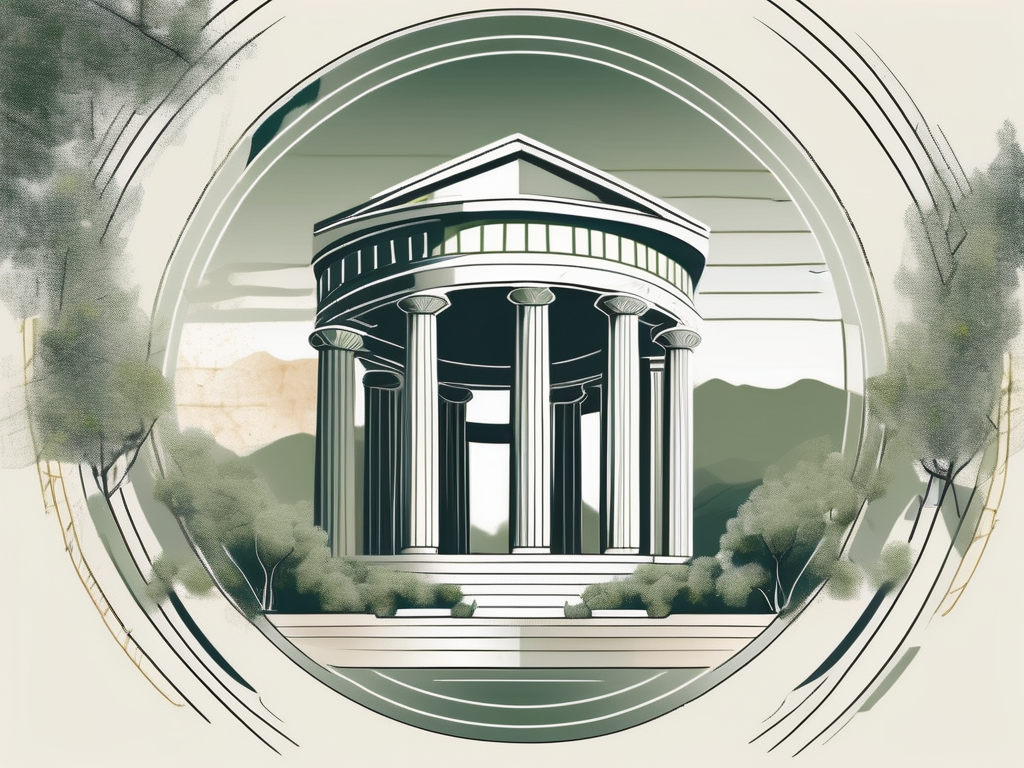Stoicism, a thought-provoking and practical philosophy, has been gaining popularity in recent years. But what exactly does it mean to be a Stoic? In this article, we will delve into the depths of Stoicism, exploring its origins, key principles, and its relevance in our modern lives. So, let’s begin our journey of understanding Stoicism.
Understanding Stoicism
Stoicism, a philosophy that originated in ancient Greece around the 3rd century BCE, has captivated the minds of many throughout history. Its founder, Zeno of Citium, gathered a group of followers who engaged in deep discussions about a wide range of topics, including ethics, logic, physics, and metaphysics. These intellectual gatherings took place in a painted porch, known as a “stoa” in Greek, which eventually gave the philosophy its name.
At its core, Stoicism offers a path to happiness and peace of mind by encouraging individuals to understand and align themselves with the natural order of the universe. The Stoics believed that reason and virtue were the guiding principles of a well-lived life, and they sought to cultivate these qualities within themselves.
The Origins of Stoicism
The origins of Stoicism can be traced back to ancient Greece, a time of great intellectual and philosophical exploration. It was during this period that Zeno of Citium, a wise and contemplative philosopher, founded the Stoic school of thought. Zeno’s teachings attracted a diverse group of individuals, all seeking wisdom and guidance in navigating the complexities of life.
Under the shade of the painted porch, Zeno and his followers engaged in spirited discussions, delving into the depths of human existence. They explored the nature of morality, the workings of the universe, and the pursuit of a meaningful life. These conversations were not mere intellectual exercises; they were a quest for truth and a search for practical wisdom.
The stoa, with its columns and open-air design, provided a serene and contemplative space for these philosophical dialogues. It became a sanctuary for seekers of truth, a place where the complexities of existence could be pondered and understood.
Key Principles of Stoicism
The Stoic philosophy encompasses a set of key principles that can serve as a compass in navigating the challenges of life. These principles, when embraced and practiced, can lead to a life of tranquility and fulfillment.
- Live in accordance with nature: The Stoics believed that every individual has a purpose and a role to play in the interconnected web of life. By embracing our nature and understanding our place in the grand scheme of things, we can find contentment and live in harmony with the world around us. This harmony extends not only to our interactions with other human beings but also to our relationship with the natural world.
- Focus on what you can control: Stoics emphasized the importance of distinguishing between what is within our control and what is not. They recognized that there are external circumstances and events that are beyond our influence. By accepting this reality and focusing our energy on what we can control—our thoughts, actions, and attitudes—we can free ourselves from unnecessary stress and anxiety. This shift in perspective allows us to direct our efforts towards what truly matters and make the most of every situation.
- Cultivate virtues: The Stoics viewed virtues as the building blocks of a good character and a well-lived life. They believed that by cultivating virtues such as wisdom, courage, justice, temperance, and compassion, individuals could navigate the complexities of life with integrity and grace. Virtues were not seen as abstract ideals but as practical tools that could be developed and honed through conscious effort and self-reflection.
- Practice gratitude and acceptance: Stoics encouraged the practice of gratitude and acceptance as a means to find contentment and peace. They recognized the inherent value in the present moment and encouraged individuals to embrace it fully. By cultivating gratitude for what we have and accepting the inevitable ups and downs of life, we can find solace and serenity even in the face of adversity. This practice allows us to shift our focus from what is lacking to what is present, fostering a sense of fulfillment and appreciation for the richness of our experiences.
Stoicism, with its rich history and profound insights, continues to resonate with individuals seeking wisdom and guidance in the modern world. Its principles offer a timeless framework for navigating the complexities of life, encouraging individuals to cultivate virtues, embrace the present moment, and find contentment in the face of adversity. By understanding Stoicism and incorporating its teachings into our lives, we can embark on a journey towards greater self-awareness, inner peace, and a meaningful existence.
The Stoic Philosophy
The Stoic philosophy is an ancient school of thought that originated in Greece and flourished during the Roman Empire. It offers a unique perspective on how to live a fulfilling life, emphasizing the importance of living in harmony with nature and embracing reason.
Stoics believed that the key to a fulfilling life lies in our ability to cultivate virtues and practice self-discipline. By focusing on self-improvement and aligning our actions with our values, we can navigate life’s challenges with grace and resilience.
One of the fundamental teachings of Stoicism is the distinction between what is within our control and what is not. Stoics believed that external events and the opinions of others are beyond our control, and therefore, we should not be swayed by them. Instead, we should focus on what is truly important and within our control, such as our thoughts, actions, and attitudes.
Stoic Beliefs and Teachings
In addition to the emphasis on self-discipline and virtue, Stoics believed in the power of reason. They saw reason as the guiding force that allows us to understand the natural order of the universe and make rational decisions.
Stoics also believed in the interconnectedness of all things. They saw themselves as part of a larger whole, and this perspective influenced their approach to life. By recognizing our place in the grand scheme of things, Stoics believed we could find meaning and purpose in our existence.
Furthermore, Stoics emphasized the importance of living in accordance with one’s values. They believed that by aligning our actions with our values, we can lead a virtuous and meaningful life. This requires introspection and self-reflection to identify our core values and make choices that are in line with them.
Stoicism in Modern Times
While Stoicism originated thousands of years ago, its teachings remain relevant in our modern lives. In a world filled with distractions and constant change, Stoicism offers a guiding light, reminding us to focus on what truly matters and to cultivate inner strength and wisdom.
Many successful individuals, from entrepreneurs and athletes to philosophers and writers, have embraced Stoicism as a practical philosophy. Its principles can help us overcome adversity, find inner peace, and lead a more fulfilling life.
Stoicism teaches us to accept the things we cannot change and focus on what is within our control. It encourages us to approach challenges with a calm and rational mindset, rather than being overwhelmed by emotions or external circumstances.
Moreover, Stoicism reminds us of the impermanence of things. It encourages us to appreciate the present moment and not be attached to material possessions or external achievements. By cultivating a sense of gratitude and contentment, Stoicism teaches us to find joy in the simple pleasures of life.
In conclusion, the Stoic philosophy offers valuable insights and practical guidance for navigating the complexities of life. Its teachings can help us develop resilience, inner strength, and a deeper understanding of ourselves and the world around us. By embracing Stoicism, we can strive to live a more meaningful and fulfilling life.
The Stoic Mindset
The Stoic mindset is a philosophical approach to life that has its roots in ancient Greece. It is a way of thinking that emphasizes the importance of virtue and the cultivation of a rational and calm mind. Stoicism teaches individuals to live in accordance with nature and to find inner peace and tranquility.
The Role of Virtue in Stoicism
At the heart of Stoicism lies the concept of virtue. The Stoics believed that virtues are qualities that enable us to live a flourishing life. By cultivating virtues such as wisdom, courage, and justice, we can align ourselves with the natural order of the universe and live in harmony with our true nature.
For the Stoics, virtue was not just an abstract concept but a practical guide for decision-making and action. It was through the practice of virtue that individuals could cultivate moral excellence and live a life of purpose and meaning. The Stoics believed that by living virtuously, one could achieve eudaimonia, a state of true happiness and fulfillment.
Living a virtuous life meant not only acting in accordance with moral principles but also developing a strong character. The Stoics believed that character is formed through the repeated practice of virtuous actions and the cultivation of good habits. By consistently acting in virtuous ways, individuals could shape their character and become better versions of themselves.
Stoic Approach to Emotions
While emotions are an integral part of the human experience, the Stoics believed in maintaining a sense of emotional equanimity. They advocated for a rational approach to emotions, encouraging individuals to examine and understand the underlying causes of their emotions.
Stoics believed that by practicing self-control and rational thinking, one can avoid being overwhelmed by negative emotions and find tranquility even in the face of adversity. They sought to cultivate emotional resilience and maintain a calm and composed mind in all circumstances.
According to the Stoics, emotions are not inherently good or bad. Instead, they are the result of our judgments and interpretations of external events. By examining our thoughts and challenging irrational beliefs, we can gain a better understanding of our emotions and learn to respond to them in a more rational and constructive way.
The Stoics also emphasized the importance of accepting the things that are beyond our control. They believed that by focusing on what is within our control, such as our thoughts and actions, we can free ourselves from unnecessary suffering and find peace of mind. This acceptance of the external world and the recognition of our own limitations are key aspects of the Stoic approach to emotions.
In conclusion, the Stoic mindset offers a practical philosophy for living a meaningful and fulfilling life. By cultivating virtues and practicing emotional resilience, individuals can find inner peace and live in accordance with their true nature. The Stoics believed that by adopting this mindset, one can navigate the challenges of life with wisdom and serenity.
Stoicism and Personal Growth
Applying Stoic Principles in Daily Life
Stoicism is not merely an abstract philosophy but a practical guide for living a good life. By applying the principles of Stoicism in our daily lives, we can enhance our personal growth and well-being.
One way to apply Stoic principles is through the practice of self-reflection. By regularly examining our thoughts, emotions, and actions, we can identify areas for improvement and work towards becoming better individuals.
Additionally, embracing the Stoic belief in the impermanence of external possessions and circumstances can help us develop resilience and adaptability. By focusing on what is within our control, we can navigate life’s ups and downs with grace and inner peace.
The Impact of Stoicism on Mental Health
Stoicism has also been found to have a positive impact on mental health. By adopting a Stoic mindset, individuals can develop a greater sense of inner peace, resilience, and emotional well-being.
Research suggests that practicing Stoicism can lead to reduced levels of stress, anxiety, and depression. By embracing the Stoic principles of gratitude, acceptance, and resilience, individuals can find solace even in challenging times and develop a greater sense of psychological well-being.
Criticisms and Misconceptions of Stoicism
Common Misunderstandings about Stoicism
Despite its many benefits, Stoicism is not without its critics and misconceptions. One common misconception about Stoicism is that it advocates for emotional suppression or indifference. However, this is far from the truth.
Stoics recognized and acknowledged the full range of human emotions. Rather than suppressing emotions, they encouraged individuals to approach them with rationality and self-awareness. Stoicism seeks to transform our relationship with emotions, allowing us to respond to them in a way that promotes well-being and personal growth.
Addressing the Criticisms of Stoicism
Another criticism leveled against Stoicism is that it promotes passivity or resignation in the face of adversity. However, Stoicism is not about accepting the status quo or avoiding action. In fact, the Stoics emphasized the importance of taking responsibility for our lives and making the most of our circumstances.
Stoicism encourages individuals to engage fully in life, embracing challenges and setbacks as opportunities for growth and learning. By accepting what is beyond our control and focusing on our own thoughts and actions, we can cultivate a sense of agency and make a positive difference in the world.
In conclusion, Stoicism provides us with a profound and practical philosophy for living a more fulfilling life. By understanding its origins, key principles, and applying its teachings in our daily lives, we can cultivate virtues, find inner peace, and navigate life’s challenges with grace and resilience. So, let us embrace the wisdom of the Stoics and embark on the journey of self-improvement and personal growth.












